
This opinion piece discusses the urgent need for regenerative finance (ReFi) as a solution to the ongoing biodiversity crisis exacerbated by traditional extractive financial practices. The authors argue that the current financial system prioritizes short-term profits over long-term environmental sustainability, leading to significant biodiversity loss and ecological degradation. With a projected $700 billion annual biodiversity finance gap by 2030, the paper highlights the limitations of traditional conservation funding and emphasizes the importance of transitioning to regenerative economic practices. ReFi aims to restore and replenish ecosystems by embedding ecological principles within financial decision-making. The authors advocate for innovative financial instruments and decentralized finance models that prioritize inclusivity and sustainability, ultimately fostering a financial ecosystem that supports biodiversity preservation and ecological health. They call for collaborative efforts among investors, policymakers, and businesses to redefine the finance-ecology nexus and create a future where financial activities contribute positively to the planet.




